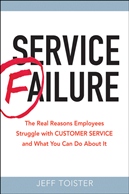Is the front line customer service employee a commodity?
 Jeff Toister
Jeff Toister  Wednesday, September 19, 2012 at 9:03AM |
Wednesday, September 19, 2012 at 9:03AM | A client recently posed an interesting question: Should frontline customer service employees be viewed as commodities where one employee is relatively the same as the other? My client is the Human Resources Director, so unsurprisingly she thought the answer is no. However, her company’s Chief Financial Officer firmly believed the answer is yes.
Who do you think is right?
The argument for "No"
My client believes there is a meaningful difference in each individual’s ability to be trained, deliver exceptional service, and ultimately generate profits. If you want to attract and retain better talent, you need to invest more in your employees in terms of wages, benefits, and training. There is certainly plenty of empirical evidence to back up this claim (see my recent post, “Three reasons to give customer service employees a raise”).
The challenge, of course, is proving this to a skeptical CFO or even the company’s CEO in a time when the company is focused on reducing costs. Any increase in wages, benefits, or training expense will immediately be seen on the company’s profit and loss statement, but the resulting impact won’t be readily apparent. Even if revenue or customer satisfaction begins to rise, it will be hard to prove that this wasn’t really caused by an improving market, a clever advertising campaign, or a new product line.
The problem my client has in making her case is a lack of hard data to show that she’s right.
The argument for "Yes"
The CFO’s primary concern is controlling costs and maintaining cash flow at a time when profit margins are shrinking. To him, adding costs immediately makes that problem even worse. It’s foolish to spend the money if he can’t prove that investing more in employees will provide a positive return on investment. He is also drawing from his own belief that frontline customer service employees’ performance is more a reflection of the system (products, processes, and management) than their individual strengths.
The CFO’s challenge, however, is the same as the Human Resources Director’s: a lack of hard data. Sure, he can see labor expense on the profit and loss statement, but looking at those numbers in aggregate can obscure what’s really going on. An outstanding employee might generate twice as much revenue as a co-worker, but then leave the company for a higher paying job with better benefits. The replacement employee may cost more to train while producing less revenue, but that story won't be told on the company's financial statements.
Who is right?
My view is both could be right. Great employees will flourish in almost every environment, but those employees are also hard to find. Mediocre employees can become great given the right products, processes, and management, but you need to invest time and money in those things to ensure your employees have the right support.
The best way for the HR Director and CFO to settle their debate is through testing and evaluation. For example, rather than giving all employees a raise, they can pick a test group of new hires to start at a higher salary. This minimizes risk and expense, but it also allows them to compare the test group’s performance to the rest of the new hires who join the company around the same time.
Where do you come out? Are frontline customer service employees truly unique and special? Or, are the vast majority of them really interchangeable?







